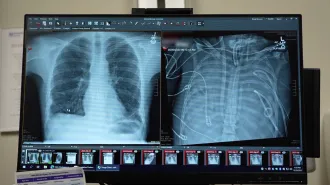Homing In on Ephedra’s Risks
On Feb. 16, pitcher Steve Bechler of the Baltimore Orioles collapsed while running sprints at the team’s spring-training camp in Florida. He died a few hours later. Subsequent investigation linked the 23-year-old player’s apparent heatstroke with a popular diet aid containing both caffeine and ephedra, a botanical product rich in other natural stimulants.

The young athlete had a weight problem. A Feb. 20 USA Today story quotes the Broward Co., Fla., medical examiner as saying that the 249-pound baseball player had hoped to shed some pounds with the help of Xenadrine RFA-1, an over-the-counter dietary supplement that bills itself as a “clinically proven weight-loss catalyst.” Its ephedra-caffeine combo revs up the bodys metabolism. The manufacturers of such supplements have argued that by increasing the body’s resting metabolic rate–the energy burned even when a person isn’t moving–fewer ingested calories will end up deposited as fat.
Shortly after Belcher’s death, lawyers representing the Minnesota Vikings suggested that Korey Stringer’s use of ephedra supplements might have contributed to the football player’s heatstroke-triggered death in July 2001, during his first day of preseason training.
Data reported this week by researchers at South Dakota State University in Brookings offered some clues to why the active ingredients in supplements made from the Ephedra sinica plant and related products may pose a special risk to athletes and others who exercise strenuously. The study was reported at the meeting Experimental Biology 2003 in San Diego.
Making the heart work even when the body isn’t
Some 18 months ago, South Dakota State exercise physiologist Matthew D. Vukovich decided to investigate earlier claims that ephedra-based dietary supplements spur weight reduction by elevating resting metabolic rate. So, he recruited eight healthy, normal-weight college students–four men and four women–to take a standard ephedra supplement containing 20 milligrams of ephedra alkaloids, Ephedra‘s natural stimulants, and 150 milligrams of caffeine. The latter is roughly the amount contained in two strong cups of coffee.
In the 3 hours after the volunteers took the supplement, their resting metabolic rate indeed climbed–by an average of 23 percent. However, Vukovich argues, this would hardly be enough to make a person quickly shed pounds. Even if that elevation were maintained for a full 24 hours after taking the supplement, he notes, it would burn off the equivalent of only a single slice of bread.
However, at the same time the supplement was elevating resting metabolic rate, it was also raising systolic blood pressure by 10 percent, Vukovich found. Thats especially disturbing, he says, since advertisements for ephedra supplements recommend that people take them before exercise to burn even more fat. Since exercise itself raises blood pressure, the combination of exercise and these diet aids might be the prescription for trouble.
To test that, he and Tasha P. Ballard, also of South Dakota State, repeated the earlier experiment, this time administering the ephedra-caffeine product to 10 men and women 1 hour before they were to exercise. The good news: For these healthy college-age recruits, blood pressure didnt spike during exercise–at least not beyond that attributable to the exercise alone.
But the researchers did find that the supplement significantly elevated the students’ heart rates. Beginning shortly after the recruits took the product, their hearts started pumping about 15 to 17 percent faster.
An hour into the trial, each volunteer began riding a stationary bicycle at a moderate but not exhausting clip. For 60 minutes they pedaled away at a rate that pushed them, but not hard enough that they couldnt carry on a conversation. Throughout this period, their heart rate remained elevated by some 15 percent or so above what it was when they had exercised comparably hard but hadn’t taken the ephedra-caffeine product, Vukovich told Science News Online.
He and Ballard continued to monitor heart rate among these volunteers for an hour after exercise. Their heart rates remained elevated throughout this period.
Such a heart-rate increase can push up body temperature, says Vukovich. Especially if overweight people who don’t drink enough fluids during exercise, this extra effort by the heart could dangerously increase their risk of becoming dehydrated and overheated, he says. For people with undiagnosed high blood pressure, he worries that the risks could be even greater.
Perhaps the biggest risk is that athletes and others looking for quick weight reduction may be tempted to overindulge in ephedra-based supplements. After all, they’re billed as safe, so if one dose is good, a double dose might be better. Because these products have potent cardiac effects, despite their reassuring labels, there can be very real dangers in even recommended doses. Indeed, a new analysis of serious side effects among ephedra-product users suggests that their risk of health damage outweighs any chance of a weight-reduction benefit (SN: 4/12/03, p. 237: Available to subscribers at Weight-loss pill carries risks).
Last July, an investigation by the General Accounting Office, a watchdog agency of Congress, reported that at least 10 U.S. deaths had been linked to ephedra products (see “Diet pills: Its still buyer beware”: Diet Pills: It’s Still Buyer Beware). In some cases, seemingly healthy people suffered a stroke or heart attack after taking over-the-counter ephedra products as directed. Others experienced seizures, insomnia, personality changes, and permanent nerve damage.
Other studies have shown that many herbal supplements, including ephedra products, might not deliver the active ingredients in amounts described in the labeling. Some carry more than the package indicates; others, less. Its a situation that Will Gurley and his colleagues at the University of Alabama in Birmingham described graphically in a study 3 years ago, in which they evaluated the contents of 20 commercial ephedra supplements. Not only did their chemical analyses demonstrate that ephedra alkaloids content “often differed markedly from label claims,” but also that it could vary dramatically between batches of the same commercial product.
FDA examines ephedra products
Currently, dietary supplements are subject to little U.S. regulation. As long as their labels dont claim that the product acts as a drug–for instance, that it cures a disease–they remain largely exempt from Food and Drug Administration scrutiny.
However, on Feb. 28–fueled in part by a media blitz over Bechlers death–the FDA announced that it was “seeking rapid public comment” on whether the currently available data on ephedra products indicate that these supplements pose a “significant or unreasonable risk of illness or injury.” Such a finding must occur before FDA can regulate a dietary supplement.
An FDA white paper on ephedra supplements, issued the same day, concluded that “concerns about serious complications from ephedra use are not unreasonable–especially in cases involving strenuous exercise, concomitant use of other stimulants [such as caffeine], and underlying medical conditions that limit cardiovascular capacity or ability to discharge body heat.”
The white paper noted that while the FDA and the Federal Trade Commission would begin investigating certain ephedra-supplement makers for possible unsubstantiated claims, the Bush administration was proposing new mandatory warning labels for ephedra-product packaging. These “would make clear to users,” FDA said, “via a black-box warning on the front of the product, as well as additional information in the product labeling, that serious adverse effects and death have been reported.” Those warnings would point out “that risks of adverse events are particularly high with strenuous exercise and/or use of stimulants including caffeine.”
Finally, the FDA said it was looking into whether versions of ephedra-alkaloids, at least one of which is chemically identical to a controlled-substance drug, may need to be regulated as drugs.







